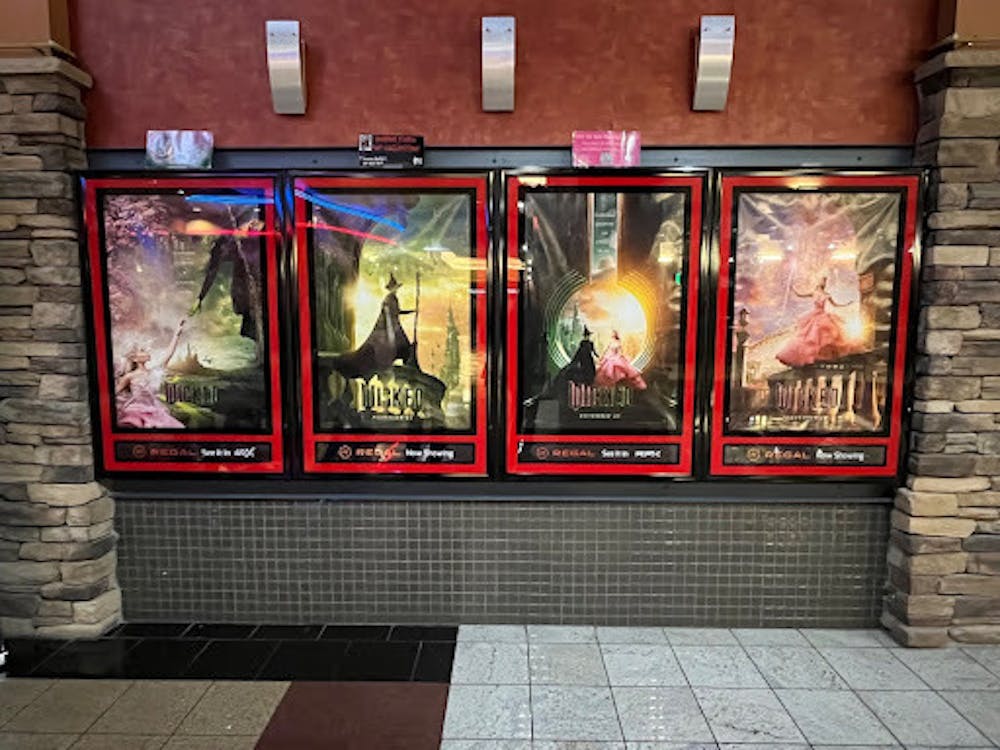To call this film long-awaited would be an understatement. “Wicked” has received “Barbie” (2023) level advertising, including promotions aired nearly constantly during the 2024 Paris Olympics. The film’s publicity is expected, given its extensive run since its 2003 Broadway debut and a star-studded cast directed by Jon M. Chu, who is known for other familiar films such as “Crazy Rich Asians” and “In the Heights.”
With a $145 million budget and a nearly three-hour runtime for the first part alone, there are high stakes attached to the success of this film, and the two-part split shows the anticipated market for both parts of this musical film epic.
Fans may be disappointed to hear that there are no new songs added to part one of “Wicked,” and that the film’s bloated runtime is instead filled with exposition and character building. Viewers may find themselves checking the time as they are bombarded with emotionally charged moments used to expand the musical’s original length. While there are many seemingly arduous scenes, the film ultimately maintains a somewhat reasonable pace, and the characterization of the two leads leads towards a satisfying finale.
It is safe to say that no actor’s talent is wasted in “Wicked.” Acclaimed theater actress Cynthia Erivo portrays Elphaba, the intelligent and misunderstood “wicked witch of the west” in a way that allows the audience to feel that they are in good hands for the entire 160-minute runtime; Ariana Grande brings subtle acting in her role as Galinda, whose character can occasionally be reduced to a bubbly, dumb blonde.
The film’s casting gave every actor an opportunity to utilize their talents. “Bridgerton” star Jonathan Bailey conveys a charismatic and endlessly swoony prince-charming in his role as Fiyero, Oscar winner Michelle Yeoh brings refinement to her Madame Morrible, and Jeff Goldblum, who isn’t usually associated with musical theater, gives a wonderful performance as The Wizard. While a theatergoer can expect exaggerated acting from stage productions, the actors in this film opt for subtlety, which is one of the many ways that this film differs from its source material.
One of the pitfalls of 21st century movie musicals is the hesitation to allow such movies to feel like musicals; theater fans complained that this was the main issue with this year’s film “Mean Girls.” This might be one of the largest faults of “Wicked.”
While there are some musical numbers that involve dancing and large ensembles, like the aptly titled “Dancing Through Life,” these songs are few and far between, and the choreography seems to veer toward stunt work more than dance. Compared to other musical films, like both iterations of “West Side Story,” “Wicked” doesn’t seem to showcase dancing as much as action.
The film’s music, on the other hand, is a strength. While there are some forgettable vocal performances, most of the songs deliver what is expected in a musical. The most standout vocal performance is given by the film’s lead, Erivo, who delivers chill-inducing, powerhouse songs sure to induce strong emotions in any viewer (including this often cynical writer).
Another strongpoint of the film is its accomplishment in world-building. While, like nearly every other recent film, there is a frustrating and often tacky reliance on CGI, there is also stunning set design that transports the viewer from Shiz, the boarding school where the main characters are introduced, to the Emerald City.
The film’s beautiful and elaborate costuming is the most visually satisfying element of “Wicked,” and makes up for some of the (unintentionally) funny scenes involving talking, computer generated animals. Considering that most of the action is set at a magical boarding school, the film’s aesthetic could perhaps be described as “Harry Potter” meets “The Nutcracker,” and there is no shortage of whimsy.
Diversity is also displayed in multiple ways through the film’s cast. In keeping with the stage show, Elphaba’s sister Nessarose uses a wheelchair, and is played by disabled actress Marissa Bode. Multiple leading characters are played by people of color, including the film’s protagonist. One of the most widely reported changes from stage to film was the gender-bending of the character Pfannee, who is changed from Galinda’s female friend to what is essentially a “sassy gay friend” and portrayed by Saturday Night Live’s Bowen Yang.
Furthermore, queer fans may delight in the film’s casting of several openly LGBTQ actors in lead roles. There are even a few (though very brief) moments of implied queerness with characters such as Fiyero, and as others have interpreted, in the two leads of the film. These themes of diversity make sense given the eclectic fanbase of this film, and of “The Wizard of Oz.” While the “Wicked” filmmakers could easily be accused of tokenism for the sake of profit, this diversity emulates one particular “Wicked” lyric: “everyone deserves the chance to fly,” which makes this inclusivity ultimately feel heart-warming.
Like in most media, there are strong political undertones in this film. There are heavy themes of racism, propaganda, and considering the allegorical theme of animal oppression, literal scapeGOATing. These themes, at times, feel painfully obvious and cliche, but ultimately, the story is motivated most by these perpetual themes of manipulation and political wickedness.
These political messages will likely strike a chord with many viewers in the wake of the recent election, and this, combined with the musical’s well-established reputation, will help “Wicked,” and in the next year “Wicked: Part Two,” soar in the box office.
The arts desk can be reached at arts@ubspectrum.com





